(5th LD) Trump-Mexico-tariffs
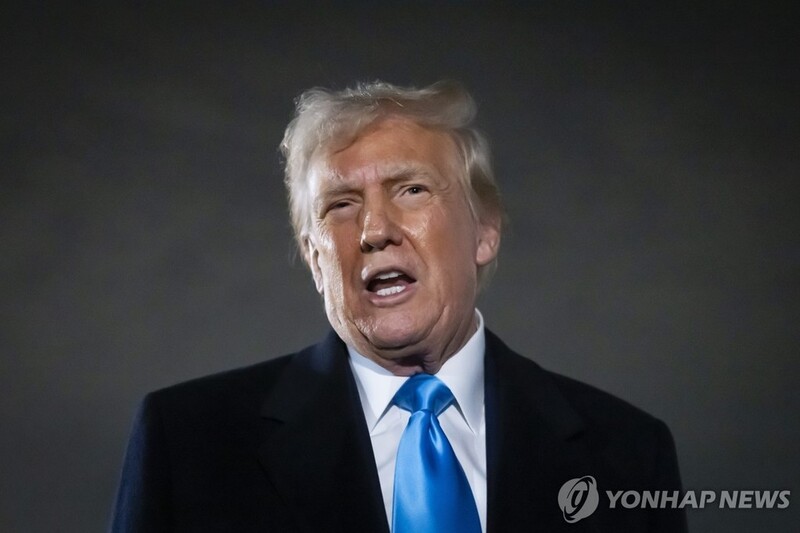 |
| ▲ This photo, released by the Associated Press, shows U.S. President Donald Trump speaking to reporters after arriving at Joint Base Andrews in Maryland on Feb. 2, 2025. |
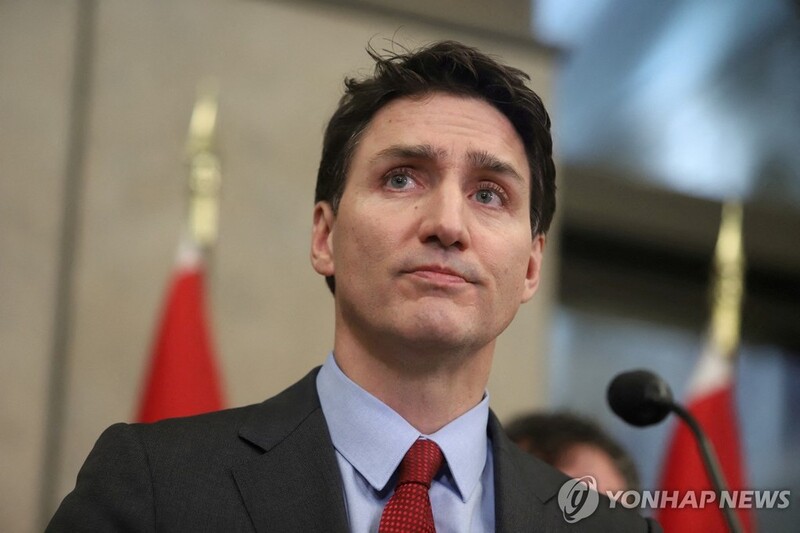 |
| ▲ Canada's Prime Minister Justin Trudeau looks on during a press conference in Ottawa, Ontario, on Feb. 1, 2025, while responding to U.S. President Donald Trump's order to impose 25 percent tariffs on Canadian imports, in this photo released by Reuters. (Yonhap) |
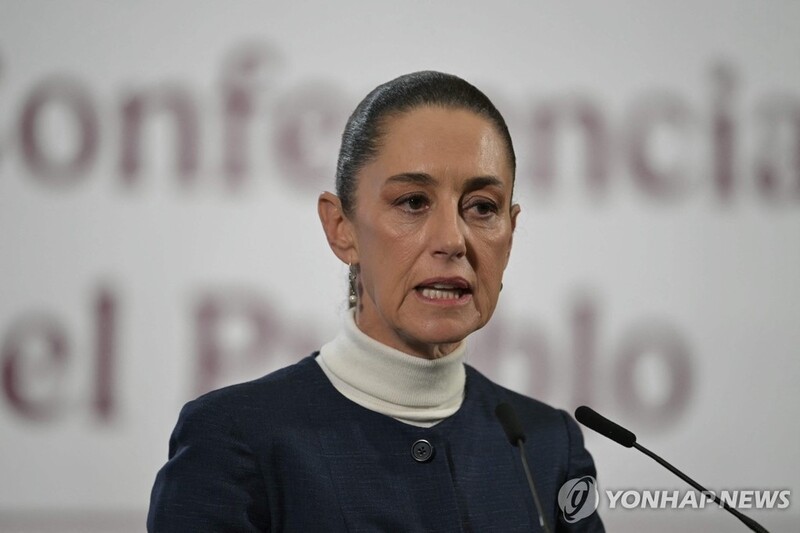 |
| ▲ Mexican President Claudia Sheinbaum speaks during her daily press conference at the National Palace in Mexico City on Feb. 3, 2025, in this photo released by AFP. (Yonhap) |
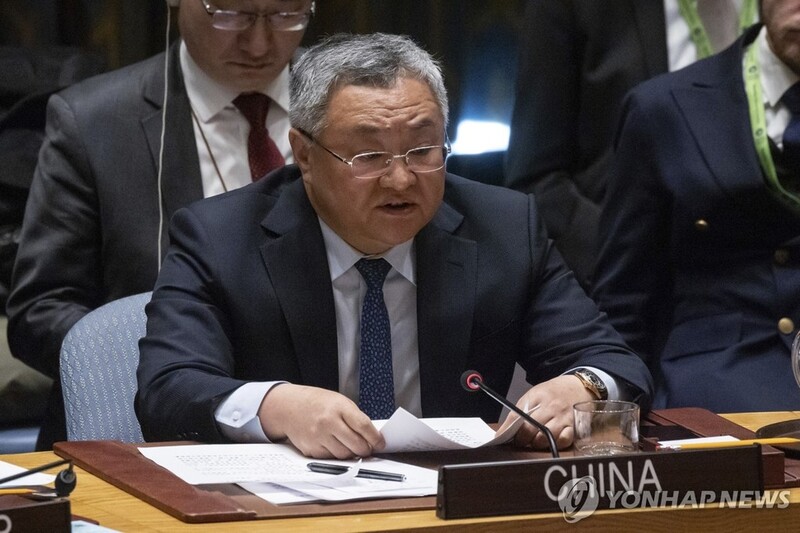 |
| ▲ This photo, released by the Associated Press, shows China's Ambassador to the U.N. Fu Cong speaking during a Security Council meeting at the U.N. headquarters on Jan. 20, 2025. |
(5th LD) Trump-Mexico-tariffs
(5th LD) Trump agrees to pause tariffs on Mexico, Canada for 1 month
(ATTN: REWRITES throughout; ADDS photo)
By Song Sang-ho
WASHINGTON, Feb. 3 (Yonhap) -- U.S. President Donald Trump agreed Monday to pause anticipated impositions of tariffs on Canada and Mexico for a month as the two countries unveiled new plans to fend off drug trafficking at their borders with the United States.
Trump spoke separately with Canadian Prime Minister Justin Trudeau and Mexican President Claudia Sheinbaum as 25 percent tariffs on Canadian and Mexican imports had been set to go into effect Tuesday, under an initiative that Trump justified to block the inflow of illegal migrants and drugs, including fentanyl.
The last-minute agreement came amid growing fears that Trump's utilization of tariffs to achieve foreign policy goals would result in higher U.S. consumer prices, supply chain disruptions and other repercussions for the world economy.
After a call with Trump, Trudeau wrote on social media that Canada will implement a C$1.3 billion (US$893 million) border plan, which he said includes reinforcing its border with new choppers, technology and personnel; enhanced cooperation with U.S. partners; and increased resources to stop the flow of fentanyl.
The prime minister added that nearly 10,000 front-line personnel will work on protecting the border and that Canada will appoint a "Fentanyl Czar," list cartels as terrorists, ensure "24/7 eyes" on the border and launch a Canada-U.S. Joint Strike Force to combat organized crime, fentanyl and money laundering.
"Canada has agreed to ensure we have a secure Northern Border, and to finally end the deadly scourge of drugs like Fentanyl that have been pouring into our Country, killing hundreds of thousands of Americans, while destroying their families and communities all across our Country," Trump wrote on Truth Social.
Following a call with Sheinbaum earlier in the day, Trump announced that she agreed to immediately deploy 10,000 Mexican soldiers to the border separating Mexico and the U.S. to stop the flow of fentanyl and illegal migrants into the U.S.
"We further agreed to immediately pause the anticipated tariffs for a one-month period," Trump said.
Over the next one month, Secretary of State Marco Rubio, Secretary of Treasury Scott Bessent and Secretary of Commerce Howard Lutnick will engage in negotiations with high-level Mexican representatives, Trump said.
"I look forward to participating in those negotiations, with President Sheinbaum, as we attempt to achieve a 'deal' between our two countries," he said.
In a separate social media post, Sheinbaum also announced the agreement, saying the two countries will work together on security and trade.
Over the weekend, Trump announced plans for 25 percent tariffs on Mexican and Canadian imports with a carve-out for Canadian energy products to be taxed at a 10 percent rate and for a 10 percent tariff on goods from China.
He also warned the U.S. would escalate the rates in the event of retaliation from the targeted countries.
Amid growing concerns over the potential ramifications of tariffs, Trump acknowledged on social media Sunday that there might be "some pain," but it will be "worth the price that must be paid."
South Korea has been carefully watching what appears to be a looming trade spat as hundreds of South Korean businesses are operating in Mexico amid fears that U.S. tariffs on Mexico, if effectuated, will have an adverse impact on their businesses.
During a press availability in the afternoon, Trump said that the U.S. will be speaking to Chinese officials "over the next 24 hours." He warned that if the two sides cannot make a deal, U.S. tariffs on China will be "very substantial."
"We'll have some good meetings with China. We have meetings planned, and we'll see what happens," he told reporters in the Oval Office.
"But that was just an opening salvo. If we can't make a deal with China, then the tariffs will be very, very substantial," he added, indicating that the tariffs could go beyond 10 percent.
Trump also touched on China's involvement in the Panama Canal.
"Now, we had another big thing, speaking of China. China's involved with the Panama Canal," he said. "They won't be for long, and that's the way it has to be."
He added, "We are going to get something very strong, or we are going to take it back and China will be dealt with."
Trump has expressed his intent to retake the strategically crucial canal that Panama took control of in 1999, claiming that American ships have been "severely overcharged" and "not fairly treated," and that China is operating the canal.
In a press conference, Chinese Ambassador to the U.N. Fu Cong reaffirmed China's opposition to what he called an "unwarranted" increase in U.S. tariffs, saying that there is "no winner in a trade war."
"We do believe that this is in violation of WTO rules. That's why China is filing a complaint at the WTO," he said, referring to the World Trade Organization. "We may be forced to take countermeasures."
He also claimed that Beijing has the "most stringent" regulations on fentanyl as he urged the U.S. to look at the "demand side of fentanyl rather than shifting the blame onto others."
(END)
(C) Yonhap News Agency. All Rights Reserved





















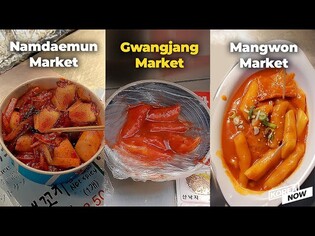






![[가요소식] TXT](/news/data/20251220/yna1065624915960696_833_h2.jpg)









